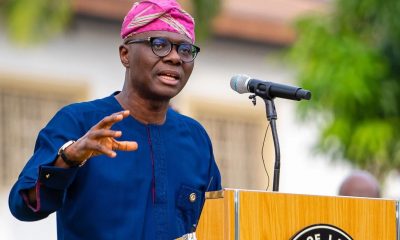Business
25% of 2022 capital expenditure may not be funded –Economists

ABOUT 25 per cent of the projected N4.5tn capital expenditure in the 2022 Appropriation Act may not be funded, going by the funding priority of the Federal Government in the 2022 fiscal year, findings contained in a report by economists at AgustoConsulting showed.
Economists at AgustoConsulting, a renowned firm in business advisory including economics, finance and strategy, disclosed this in their report on ‘The 2022 Appropriation Act: Impact on the Construction Industry.’
The report was presented at the just concluded business roundtable organised by the Nigerian Institute of Quantity Surveyors and the Federation of Construction Industry, and was obtained by our correspondent from the NIQS in Abuja on Sunday.
In the report, the founding Managing Director, Agusto & Co. Ltd, Olabode Agusto, explained that the plan of the Federal Government, based on the 2022 Appropriation Act, was to spend N14.7tn in 2022.
ABOUT 25 per cent of the projected N4.5tn capital expenditure in the 2022 Appropriation Act may not be funded, going by the funding priority of the Federal Government in the 2022 fiscal year, findings contained in a report by economists at AgustoConsulting showed.
Economists at AgustoConsulting, a renowned firm in business advisory including economics, finance and strategy, disclosed this in their report on ‘The 2022 Appropriation Act: Impact on the Construction Industry.’
READ ALSO:
- Fiancé of lady who called off wedding shares his own story
- Osinachi: Fani-Kayode’s ex-wife releases photos of domestic violence
- K1 releases cosy photos after report of fight with wife + Photos
The report was presented at the just concluded business roundtable organised by the Nigerian Institute of Quantity Surveyors and the Federation of Construction Industry, and was obtained by our correspondent from the NIQS in Abuja on Sunday.
In the report, the founding Managing Director, Agusto & Co. Ltd, Olabode Agusto, explained that the plan of the Federal Government, based on the 2022 Appropriation Act, was to spend N14.7tn in 2022.
“Balance available to finance capital expenditure is N3.4tn.” they stated, adding, “this means that the Federal Government of Nigeria should be able to fund N3.4tn out of the planned capital expenditure of N4.5tn (75 per cent).”
Going by the above information, it then implies that about 25 per cent of the capital expenditure in the 2022 Appropriation Act may not be funded by the Federal Government in 2022.
Commenting on this, the President, NIQS, Olayemi Shonubi, stated that the construction sector was vital for the development of the country, stressing that it was important to fund capital projects.
He said, “The construction industry is a major contributor to the Gross Domestic Product of Nigeria and a barometer for measuring the health of the economy due to various linkages and multiplier effects it has on other sectors of the economy and employment.
READ ALSO:
- MNJTF Kills 10 ISWAP Commanders, 100 Fighters In Lake Chad
- ASUU Strike: Your Presidential Ambition Dead On Arrival, Angry Students Blast Ngige
- Ex-Gov Yari, Senator Marafa dump APC for PDP
“It has therefore become expedient to brainstorm and analyse the details of the Appropriation Act 2022 which commences in June 2022 with special emphasis on this year’s total aggregate expenditure of N17.1tn, a total of N5.4tn is projected to be spent on capital expenditure.”
On his part, the President of FOCI, Nasiru Dantata, said the recent hyper inflationary trend on the basic prices of key construction resources in the country had become a great concern for its members.
He said, “Within the space of January to March 2022, the prices of key basic materials have jumped several points over their original prices at the beginning of the year.
“This position is further compounded by the Variation of Price allowance in all ongoing projects which is limited to five per cent, but are now practically unrealistic in the light of the current hyperinflation of the economy.
“This situation therefore affects the fate of construction projects and activities in the country, critically disrupting contract execution, cash flows and the economics of job creation tied to these ongoing projects.”
Dantata, however, noted that operators in the construction industry were hopeful to get solutions that would ensure the favourable implementation of the 2022 Appropriation Act.
He said industry players were also expecting recommendations on how to resolve some of the challenges faced by the construction sector.
PUNCH
Auto
Yuletide: Chisco deploys new luxury, mini buses, top quality services

Yuletide: Chisco deploys new luxury, mini buses, top quality services
…hails Tinubu for 50% fare rebate

Nigeria’s Transport Company of the Year, Chisco Transport Ltd, has deployed in various routes nationwide its newly procured new luxury and mini buses with the latest innovative features in the industry.
It assured the travelling public of safe and top quality services on all its routes this Christmas/New Year season, and beyond.
It stated this in a statement released on Tuesday, adding that the company, which had been one of the country’s front runners in long distance passenger transportation and logistics for over 45 years, recently inaugurated about four new branches in order to bring its services closer to its teeming customers.
It listed some of the new branches that had helped to boost service delivery this Yuletide season as in Awka, Enugu, and on Okota Road (near Cele Bus Stop on Oshodi-Apapa expressway), Lagos.
It stated, “This is in addition to embarking on a comprehensive maintenance of the existing fleet of buses in order to ensure they are in roadworthy shape for trips across Nigeria and the Lagos-Cotonou-Lome-Accra international route.
“Apart from advanced safety features like real-time GPS tracking and efficient safety systems, the new-look Chisco Transport fleet, featuring state-of-the-art buses, has all it takes to guarantee that passengers travel in style with their comfort and safety prioritised this season.”
It stated that the updated fleet had enhanced the popular Chisco 24 to 48-hour nationwide mail and parcel services.
All these, the leading transport solutions and logistics provider said, are part of deliberate efforts to ensure seamless and comfortable bus and logistic services to the customers during the 2024 Yuletide season and thereafter.
Chisco’s Head of Business Operations, Mr Buchi Ochuba, in the statement explained that the same commitment to ensuring safe and comfortable trips out of major cities and towns before Christmas, would also be deployed to return journeys in the new year.
He said that the management was aware that the huge investments the company had been making towards upscaling its services recently earned it the Transport Company of the Year at the recent Nigeria Auto Journalists Association (NAJA) Awards in Lagos.
Ochuba reiterated Chisco Transport’s resolve to sustain the high standards that earned the company an enviable reputation, as well as continue investments in safety and comfort of travellers that have earned it the confidence of the travelling public and the auto journalists’ award.
“We appreciate the fact that in adjudging Chisco Transport the Transport Company of the Year, NAJA must have taken into consideration the high standards of our services, the over 50 new air-conditioned buses we procured recently, the new branches we inaugurated, our customer reward scheme and other investments we made to enhance passenger transportation and logistics,” Ochuba stated.
According to him, everything is in place to make certain that the teeming Chisco Transport customers all over Nigeria and on the international route enjoy top quality services, adding “We wish them a wonderful Christmas and a highly prosperous 2025.”
Chisco Transport also applauded President Bola Tinubu for the gesture of subsidising inter-state luxury bus transport fares by 50 percent this Christmas season.
Drawing attention to the importance of infrastructure to the road transportation business, the statement further commended the President for the appreciable allocations for the sector in the 2025 budget.
“We, therefore, wish to urge members of his cabinet to put in more deliberate efforts to help the President attain his vision with speedy and prudent execution inspired by patriotism.”
On the current sharp increase in fares across the routes, the award-winning transport company blamed the situation on rising costs of maintaining the buses, as well as on the high pump prices of diesel and petrol.
The Head of Operations, however, added that at the peak of every Christmas season, long distance buses are almost empty during return trips, which leads to a situation whereby the fares for the first journeys are raised to cushion the losses incurred during reverse trips.
Business
Naira exchanges N1,650/$ in parallel market

Naira exchanges N1,650/$ in parallel market
Yesterday, the Naira appreciated N1,650 per dollar in the parallel market, compared to N1,655 on Monday.
Similarly, the Naira appreciated to N1,535 per dollar in the official foreign exchange market.
Data published by the Central Bank of Nigeria, CBN, showed that the exchange rate for the Nigerian Foreign Exchange Market (NFEM) fell to N1,535 per dollar from N1,537 per dollar on Monday, indicating N2 appreciation for the naira.
READ ALSO:
- Tension as Anambra community union asks monarch to stop Ofala Festival
- Exchange rate ends 2024 at N1,535/$1, marking a 40.9% depreciation
- Lagos govt clears traders from rail tracks at Bolade, Oshodi
Consequently, the margin between the parallel market and NFEM rate narrowed to N115 per dollar from N118 per dollar on Monday.
Naira exchanges N1,650/$ in parallel market
Business
Exchange rate ends 2024 at N1,535/$1, marking a 40.9% depreciation

Exchange rate ends 2024 at N1,535/$1, marking a 40.9% depreciation
The exchange rate between the naira and the dollar ended the year at N1,535/$1 representing a 40.9% depreciation for 2024.
The official exchange rate between the naira and dollar closed in 2023 at N907.11/$1 thus depreciating by 40.9% for the year which compares to a 49.1% devaluation at the end of 2023.
READ ALSO:
- Lagos govt clears traders from rail tracks at Bolade, Oshodi
- Four countries that won’t celebrate New Year
- Social media abuzz over Fayose claim of N50m donation to VeryDarkMan’s NGO
Nigeria introduced several foreign exchange policies in 2024 as the central bank expanded on market-friendly forex policies to attract foreign investors.
Meanwhile, on the parallel market where the exchange rate is sold unofficially, the naira exchanged for N1,660 to the dollar when compared to N1,215/$ according to Nairametrics tracking records. This represents a 26.8% depreciation.
Exchange rate ends 2024 at N1,535/$1, marking a 40.9% depreciation
-

 metro3 days ago
metro3 days agoFarotimi to pursue disbarment over arrest, defamation allegations
-

 Business2 days ago
Business2 days agoReal reason Dangote, NNPC drop petrol price — IPMAN
-

 Sports1 day ago
Sports1 day agoAnthony Joshua prostrates before Governor Abiodun during Ogun visit
-

 Health2 days ago
Health2 days agoABU Teaching Hospital will begin kidney transplant in 2025 – CMD
-

 metro3 days ago
metro3 days agoNigerian govt urged to intervene in Mozambique post-election violence
-

 metro1 day ago
metro1 day agoWanted terrorist commander, Bello Turji, a dead man walking – DHQ
-

 metro23 hours ago
metro23 hours agoFour countries that won’t celebrate New Year
-

 metro1 day ago
metro1 day agoN180m not missing from my account, it was all a plan – Verydarkman







